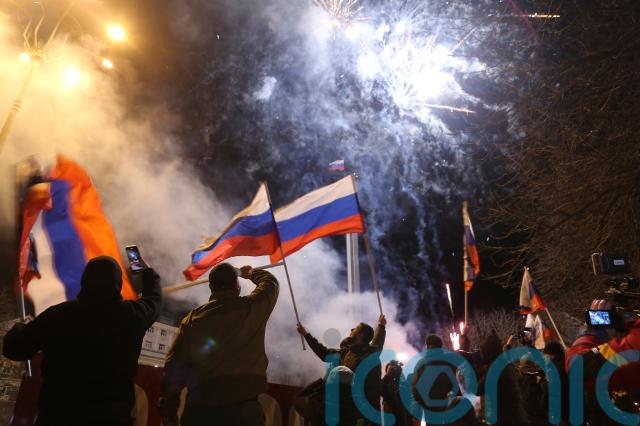
The crisis between Russia and the West has intensified following Vladimir Putin’s decision to recognise breakaway republics in east Ukraine.
– What is the cause of the tension in the region?
The current difficulties date back to the overthrow in 2014 of the pro-Moscow Ukrainian government of Viktor Yanukovych, prompting fears in the Kremlin that the country was moving into the orbit of the West.
President Vladimir Putin responded by sending in troops to annex Crimea while Russian-backed separatist rebels seized territory in eastern Ukraine in bloody fighting with the Ukrainian military.
– What has happened now?
Mr Putin has decided to recognise the two Russian-backed regions in east Ukraine – Donetsk People’s Republic and Luhansk People’s Republic – as independent states.

He has ordered troops into the two regions to “maintain peace” – crossing the red line set by the West by deploying Russian forces on Ukrainian territory.
– What has been the response?
The UK, European Union and United States will all impose economic sanctions.
My statement condemning Russia’s recognition of the ‘Donetsk People’s Republic’ and ‘Luhansk People’s Republic’ as independent states 👇 pic.twitter.com/e0y3LNu29X
— Liz Truss (@trussliz) February 21, 2022
Boris Johnson said the measures being imposed by the UK were the “first barrage” because further action would be taken if the situation escalated.
– So, what next?
The West will hope the economic pressure it can impose through sanctions will persuade Mr Putin to back down.
But he has an estimated 150,000 troops ringed around Ukraine and Mr Johnson warned “all the evidence is that President Putin is indeed bent on a full-scale invasion of the Ukraine”.
An attempt to conquer Ukraine could lead to a prolonged and bloody conflict.
– Could there be a wider war?
Ukraine is not a member of Nato, so the alliance’s members – including the UK – will not play a direct role in fighting.
The UK has supplied anti-tank weapons to the Ukrainian army and other support is being considered.
But Russian aggression in eastern Europe is likely to increase anxiety among Nato’s members.
This could lead to a further build-up of forces, potentially increasing tensions even further in the region.
– What is the advice for Britons in Ukraine?
I continue to work in Lviv with my team. I strongly advise British Nationals to leave the country while commercial travel is available. Please contact us if you need advice or help on +380 44 490 3660 or check https://t.co/2Xn3ZWzCzD for latest travel advice and info.
— Melinda Simmons (@MelSimmonsFCDO) February 22, 2022
They have already been told to leave while it is still possible to do so.
The British ambassador in Ukraine Melinda Simmons has relocated from the embassy in Kyiv to Lviv in the country’s west due to fears about the risk posed to the capital from an invasion.
In a message on Tuesday she said: “I strongly advise British nationals to leave the country while commercial travel is available.”
Subscribe or register today to discover more from DonegalLive.ie
Buy the e-paper of the Donegal Democrat, Donegal People's Press, Donegal Post and Inish Times here for instant access to Donegal's premier news titles.
Keep up with the latest news from Donegal with our daily newsletter featuring the most important stories of the day delivered to your inbox every evening at 5pm.